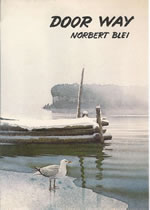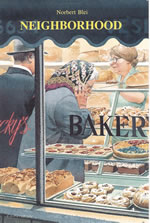| Adventures in an American’s Literature
|
Blei’s novel, set in the high ‘60s, chronicles the adventures of one Miroslav Blazen, a Chicago hoodlum reclaimed by his English teacher and parish priest, as he passes through Illinois State University and begins a marriage and teaching career first at blue-collar Campbell City High, then in North Highland, in the Chicago ’burbs. Teacher, poet and lover, “Hassock” falls victim to intellectually constipated educationists and uptight students. Blei’s novel resembles, and may be the origin of some elements of Dead Poets Society.
“A satirical, comical look at the high school English class. . . . [It] should prove particularly entertaining to anyone involved in teaching high school English. It would certainly help the general public understand what really goes on in the American high school. This book will provide valuable perspective to any undergraduate considering teaching as a career [and] help prospective teachers realize that the high school classroom is not all lesson plans and behavioral objectives.”—Choice “It is the scenes in the classroom and the environs of the school that put this book in a class with that special poignant sense of Salinger, or Updike’s Other Stories. There are marvelous characters and scenes here. . . . As Wendell Berry notes eloquently in ‘Discipline and Hope,’ the loss of dedicated, inspired teachers capable of giving a lifetime of compassionate teaching remains a tragedy for this nation. One feels this on the pulse after reading Blei’s novel.”—Gargoyle Magazine “Received and Recommended”—American Book Review “Very Highly Recommended”—Wormwood 182 pages |
|
| Door Steps
|
In five seasonal essays and a daybook of 365 entries, Blei records the passing of days and seasons in Door County, in his life, in our lives. A delicate balance between the rugged Door terrain and the author’s inner landscape, Door Steps is the most private and most public of Blei’s books. The seasonal essays, especially “Christmas Eve in Door,” have long been recognized as Door County classics. Illustrations from the sketchbooks of Door County artist Charles Peterson make a nice complement to Blei’s prose.
“Blei writes in a poignant and intimate way that captures all the delicate quiet notes of the struggle to hear, sense and feel all the important textures around us . . . yet another important book from a writer who has certainly ‘been there before.’”—John Nichols “A peninsular song of the open road, Door Steps is an intense, sensitive celebration of Blei’s home turf through an entire cycle of seasons. Its poetic prose style presents a rewarding ‘inside narrative’ of meditation and expansive humor. It is replete with the particular and laced with the universal, a fine sequel and natural extension to the earlier Door Way.”—Richard Boudreau “Blei’s feelings about the place he has chosen to live are mixed; he recognizes drawbacks along with advantages. But he makes the county seem like an interesting place, and not just during those warm months when tourists are underfoot.”—Robert Wells, Milwaukee Journal “A pleasant, vicarious journey through the seasons that conveys some of the intensity and immediacy of weather, and the natural world that are so much a part of that life.”—Chicago magazine 230 pages |
|
| Door Way
|
Weaving a tapestry of lives and landscapes, past and present, earth and water, nature and man, Blei celebrates the unique heritage of Door County, Wisconsin, and suggests the precariousness of this balance, in Door County and wherever the natural environment is threatened by forces without and within. At a time of concern over endangered species, Door Way expressed concern for endangered spaces. A decade after publication, this book remains a testimony to lives lived in the true spirit of very special tale.
“A fascinating assemblage of profiles that adds up to a vivid, feeling portrait of a region.” –Studs Terkel “Blei has a fine ear and a genuine, searching, feeling humanity evident in dozens and dozens of observations.”—Chicago Tribune “Blei’s friends and neighbors have not escaped the world; they are very much a part of it, involved in the vital issues of our times.” “Norbert Blei is a writer the way people used to be troubadours and minstrels, celebrating what he has seen and heart and felt in a deceptively simple style reminiscent of the early Sherwood Anderson. . . . Like Anderson, he is a lover, and his affection invests his writing with a singular charm.”—Sydney J. Harris “I predict that, someday, his Door Country will join the great mythical-real landscapes that include Salinas, Spoon River, and Yoknapatawpha.”—Harry Mark Petrakis 308 pages |
|
| The Ghost of Sandburg’s Phizzog
|
Blei’s stories well up from the secret places of the writer’s psyche . . . and the reader’s. His characters are people we have met every day, but in his hands they touch magically and mysteriously the dark realms of legend; the World War II vet introducing his long-haired son, just returned from Vietnam, to buddies at the VFW; the mad Irishman defying his own mortality with his “chair trick”; the mother, dying of cancer, stuffing herself with smoked fish, roast lamb, salami, cheese, and bakery.
This book was a 1986 Pushcart Foundation “Writer’s Choice” selection and was selected for the NEA Literature Program’s 1987 Buenos Aires Book Fair exhibit of New American Writing. “Blei’s powerful, uneven, brooding interest dwells two streets down from Nelson Algren, a block away from Harry Mark Petrakis, and along the busy line from Ernest Hemingway to Carl Sandburg, a few versts from Chekov.”—Chicago Sun-Times “Blei may be expected to make a significant contribution to the American short-story heritage. This is a good book.”—Choice “The man is very, very good, a true son of the Middle West who descends from the brawny (and brainy) line of Sandburg and Hemingway . . . he is a grand story-teller.”—Frederick Busch “Overall, these stories in a traditional mold, often containing subtle, experimental variations on language, present a refreshing alternative to much of the autobiographical fiction written today.”—New York Times Book Review “Each of Blei’s stories is different, each breathes life into characters whose flesh and voice and spirit fill your room, your home, your heart.”—Andre Dubus 196 pages
|
|
| Neighborhood
|
They’re all here, exactly as you remember them. A butcher named Polacek, a baker named Vesecky. Doc Cermak, General Practitioner. Tony the Shoemaker, Shorty the Locksmith, Joey the Peddler. The ice cream man. The softball diamond and the roller rink. The neighborhood pub. The neighborhood theater. The old Sokol Slavsky gym, where you do gymnastics. St. Joseph’s, where the mass is still chanted in Latin. The Savings and Loan. The Bohemians. The Italians. The mushroom hunters, the wine makers.
Norbert Blei’s neighborhood is specifically Cicero-Berwyn, Illinois, 1940’s through 1970’s. It is a neighborhood now disintegrating, passing into a neighborhood of the author’s mind, a neighborhood of nostalgia. In a more general sense, it is every ethnic and urban neighborhood, in neighborhoods of our youths. We know Joey. We’ve met Shorty. We’ve been a hundred times in Vesecky’s, and we can smell that houska as sure as if it were on this table. Blei’s neighborhood is our neighborhood. In the largest sense, Blei’s neighborhood is a universal community, that sense of belonging that got lost in the rush to suburban bedroom developments and has not been recovered in condo villages, urban or rural. Blei’s requiem for the urban neighborhood is a cry for the lost heart of America, that hole in the soul where community used to be. “Wonderful, nostalgic pieces, partly autobiographical, party historical, and party fictional . . . highly recommended.”—Choice “A poignant tribute to Chicago.”—Chicago Sun-Times “’Our Town’ Blei style, and in the sense of a boyhood exquisitely remembered, it is Every Town a few decades ago. You don’t have to be Bohemian to love this neighborhood.”—Chicago Tribune 272 pages |
|
| Paint Me a Picture/Make Me a Poem
|
A selection of concrete poems, arranged chronologically from the 1960s through the 1980s, Paint Me a Picture traces Blei’s movement from cut-out and pictograph to collage to fully realized painting-poem. Work in this collection reflects and extends the traditions of Henry Miller and Kenneth Patchen, among others, while prefiguring Blei’s 46-painting series “Die Mauer” (exhibited Santa Fe, April 1993). The originals of most picture-poems contained in this book are now, like the paintings of “Die Mauer,” in private collections. Or they are lost.
Includes three short essays by Blei and a foreword (with bibliography) by Paul Schroeder, Librarian at the Folger Library, University of Maine. “The book. . . must be experienced.”—Door County Advocate 108 pages |
|
| Winter Book
|
Winter Book is a mature performance with a satisfying sense of completion. The season is winter; the dominant theme is the acceptance of small wonders, including decay and obscurity. Like Blei himself, Winter Book is alternately nostalgic, angry, and amusing. It is in some respects a very public book, in others a very personal collection. The journalistic profiles are Blei’s own experiences and friends, including public figures like Chan Harris and Al Johnson, and Door County natives, poets, musicians, and artists. Blei’s fictions explore the Door landscape on a deeper level. Blei is an astute observer whose attitudes are shared by readers inside and outside the County. Once again the personal becomes the public, and Winter Book, like Door Way, records communal experience. | |


